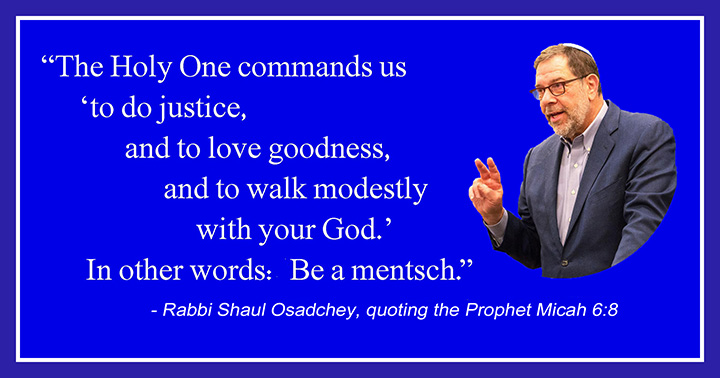
A toast to a worthy mentschCOFFEE WITH WARREN, with Warren Harbeck |

|
Ten years ago our valley was blessed with the arrival of a man of goodwill whose vision was to promote civility among members of diverse religions, too often hostile toward each other. Shaul Osadchey, former Head Rabbi of Calgary’s Beth Tzedec Synagogue, award-winning chair of several Calgary-area interfaith associations, and a frequent contributor to these columns, is returning to Houston, Texas, to pursue his community-building dreams there once more that inspired observers near and far prior to his sojourn in Alberta. At the heart of his passion is a value celebrated in the Yiddish word, MENTSCH, about which I wrote in my Nov. 20, 2014 column. “The Holy One commands us ‘to do justice, and to love goodness, and to walk modestly with your God.’ In other words: Be a mentsch,” Rabbi Shaul says, quoting from the Prophet Micah 6:8. “Mentsch simply means a human being who wrestles with life’s challenges,” he says, “someone who has a reputation for moral excellence and social rectitude. The mentsch is a person who can listen intently to that inner voice and allow it to penetrate his/her character and actions.” It’s “the type of person we hope our children will become.” And speaking of children, he notes three blessings the Jewish community asks God to bestow upon every newborn child: Torah, marriage and good deeds. “The values and teachings of the Torah (the first five books of the Bible) represent the curbs on the streets of life’s journey. They direct us forward and alert us when we are in danger of leaving the road.” The blessing of marriage, symbolized in the wedding canopy, includes both “a consecrated marriage and good and wholesome relationships with others. Respect, dignity, and consideration are the gifts a mentsch brings to people.” This implies gentle honesty, not participating in gossip, seeking out the good in others, and being a peacemaker. “In so doing, the mentsch repairs a broken world and brings Godliness into it.” His conclusion to the matter has implications for all of us. “I think it is so important that we strive to become mentschen,” he says, “so that we become kinder to our family and friends, that we learn better how to listen to the pain of others, and that we more constructively use our hands, more than our mouths, to help and to heal, and to direct our resources and commitments to building a strong community.” Applied to bridge-building among our religiously diverse sub-communities, the mentschly mentality has special significance, he says. “What are the materials that make the stones used to build the bridge? I would argue that the essential ingredients are understanding, respect, and gratitude for God’s gift of diversity. The emphasis on religious literacy is crucial to facilitating a better understanding of other people’s beliefs and practices and to eliminate stereotypes and misconceptions that lie at the heart of intolerance and prejudice.” It was with these kinds of stones in mind that the rabbi and his associates developed the preamble to the CIC Civility Pledge: “The Calgary Interfaith Council functions on the principle that listening, caring, and engaging others with respect and humility are essential to building healthy and harmonious relationships among people of all faiths and backgrounds.” For that reason and more I raise my cup in a farewell toast to a man who walks the talk: To my friend and mentor Rabbi Shaul, a worthy mentsch! May the blessing you’ve been to our community once again bless the people of Houston.
© 2019 Warren Harbeck |